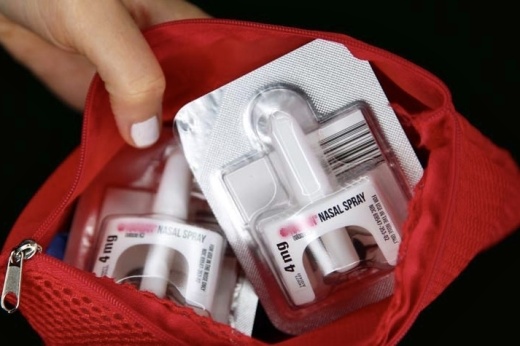The plan
Abbott’s announcement came during an April 6 summit that included state leaders, local officials and the families of Texans who died from fentanyl overdoses. The Texas Division of Emergency Management will be responsible for distributing the medication to county sheriffs, he said.
An initial 20,000 units of Narcan are available now. Each county is eligible to receive a certain portion of this allotment based on its population, according to a news release from the governor’s office.
County sheriffs’ offices can request Narcan through the State of Texas Assistance Request portal.
“We are eager to distribute life-saving medication to counteract the impacts of the fentanyl crisis," TDEM Chief Nim Kidd said in the release. "As we work together to help Texas communities combat these deadly drugs, I look forward to working with local officials and first responders to provide medication that reverses the deadly effects of opioids.”
On March 29, the U.S. Food and Drug Administration approved Narcan, a nasal spray version of the overdose reversal medication naloxone, for over-the-counter distribution. The FDA did not release an official timeline, but said in a news release that Narcan will soon be sold in drugstores, convenience stores, grocery stores, gas stations and online.
As state leaders work to stop fentanyl overdoses, Abbott said one of the biggest challenges is that “too many Texans are unaware of this deadly crisis.”
He announced the launch of a $10 million multimedia campaign to educate Texans about the dangers of fentanyl, as well as how to prevent, recognize and reverse poisonings. Public service announcements and other information will be shared on television, radio, streaming services, online and social media.
The new campaign is an extension of Abbott’s “One Pill Kills” initiative, which he introduced in October. Cecile Erwin Young, executive commissioner for the Texas Health and Human Services Commission, said “the response has been overwhelming” to the existing initiative.
“One pill kills is not just a slogan—it’s happening across Texas and across this country,” Young said. “We are committed to warning Texans about the dangers of fentanyl so that they can save the lives of their families.”
Funding for the Narcan distribution and multimedia campaign comes from multiple settlements that Texas is receiving from opioid manufacturers and pharmaceutical companies, officials said.
Legislative approach
During his State of the State address in February, Abbott designated combatting the fentanyl crisis as one of his top priorities for the current legislative session. He asked lawmakers to make it possible for prosecutors to charge people with murder after they knowingly give someone fentanyl-laced drugs that lead to their death.
Senate Bill 645, by Sen. Joan Huffman, R-Houston, would make it a first-degree felony to manufacture or distribute fentanyl that leads to someone’s death. This would include a prison sentence of at least 10 years and $100,000-$250,000 in fines.
Huffman’s bill passed unanimously out of the Texas Senate on March 15. It will now be considered by the Texas House.
In the House, Rep. Tom Oliverson, R-Cypress, created House Bill 362. The bill would make it legal to possess and manufacture fentanyl test strips. The strips are used to check if other drugs contain fentanyl, which can prevent overdoses, but they are currently considered drug paraphernalia under Texas law.
HB 362 was approved by the House with a 143-2 vote April 11, with one representative present but not voting. It now heads to the Senate. Similar legislation has been filed in the Senate, but those bills have not received committee hearings.





